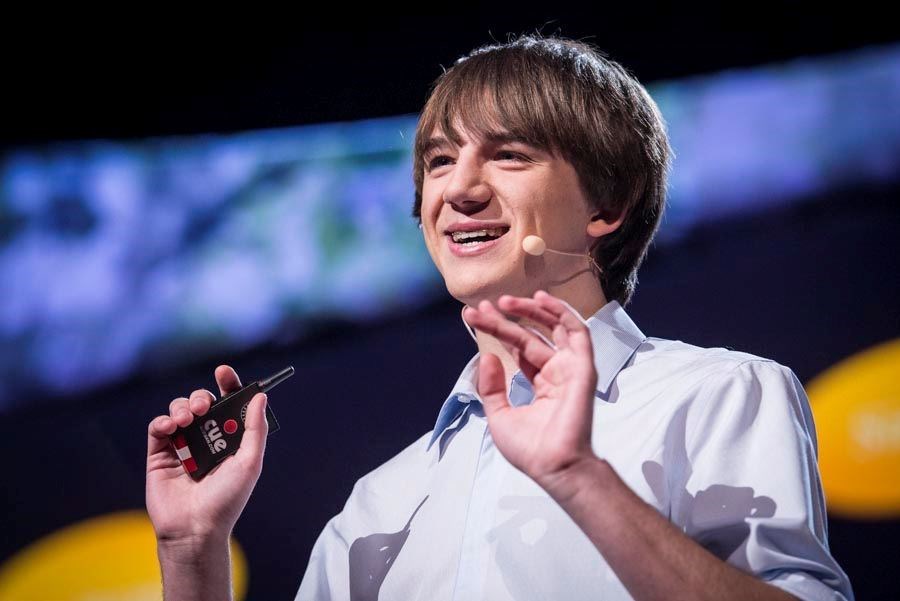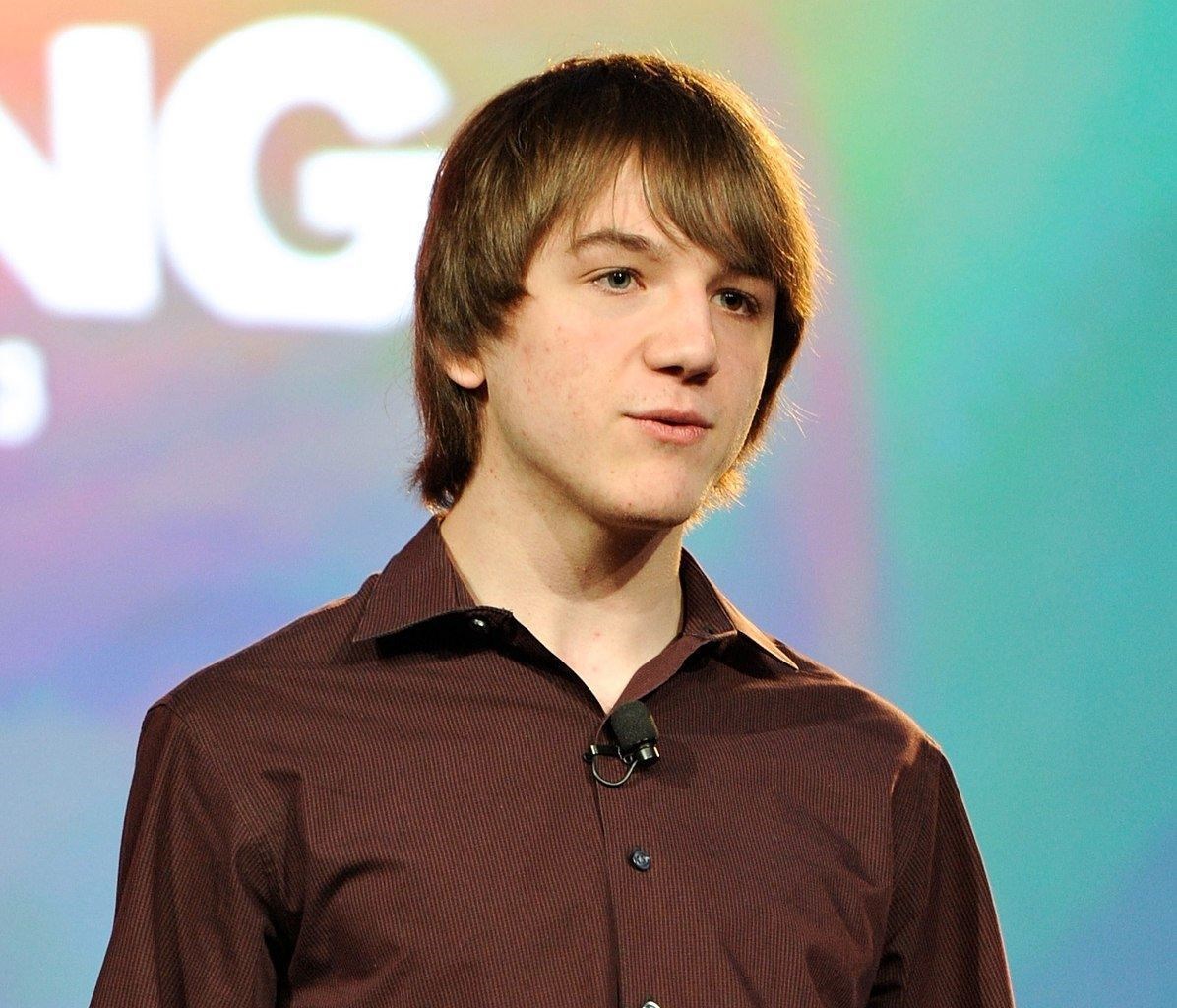Certain claims made by Jack Andraka may not be accurate, according to: https://www.snopes.com/fact-check/pancreatic-cancer-test/ https://www.forbes.com/sites/matthewherper/2014/01/08/why-biotech-whiz-kid-jack-andraka-is-not-on-the-forbes-30-under-30-list
Everyday Deserving Heroes - Jack Andraka
 Jack on TED TalkTED Conference [Public domain]
Jack on TED TalkTED Conference [Public domain]
“A hero is someone who, in spite of weakness, doubt or not always knowing the answers, goes ahead and overcomes anyway.” Renowned writer and actor Christopher Reeve explicitly defines a hero as anyone who perseveres through challenge and succeeds while being aware of inevitable struggle. A common beginning to a hero’s journey is a tragic event that fuels an internal fire. This tragedy will be the hero’s main motivation to complete their mission, or to extinguish this inner fire. True heroes show everyone how to transform their lives for the better, are selfless and wise, and care for the benefit of others. A hero never has to be widely recognized or accepted by society, and this is never their ultimate goal. The most crucial quality that every hero possesses is leaving behind an immortal legacy, one that is bound to inspire anyone to be the change they want to see. The journey that the hero embarks on is one worth sharing as it is inspiring, uplifting, and empowering. These qualities are actively present in Jack Andraka’s story. Jack Andraka is an inspiring young innovator who persevered through extreme depression and rejection, and created a scientifically ingenious invention which potentially saves millions; therefore he motivates young individuals around the world to strive for change despite any challenges.
Andraka’s journey began on January 8, 1997 in Crownsville, Maryland. He grew up humbly, and spent a lot of time with his close family friend Uncle Ted. Jack was always close to his brother, Luke, and was often found performing experiments with him in their basement which, over the years, transformed into a lab. The most memorable moments of his life were times spent in this lab, alongside his crabbing trips with Uncle Ted. However, at the mere age of 10, Andraka began struggling with himself in terms of his sexuality. As bullying in school peaked, Uncle Ted was diagnosed with pancreatic cancer, which ended up taking his life. Jack made it his ultimate goal to fabricate a solution to pancreatic cancer, whether it be a cure or early detection.
Tragedy and the need to overcome began Jack Andraka’s journey to scientific success. Prior to losing his closest family member, Andraka experienced bullying and depression throughout middle school. He was internally struggling with his sexuality. After he came out as gay, all the guys at his school were “hell-bent” on making sure that Jack never experienced a single moment of happiness (Andraka 75). Andraka came close to the dark tunnel of depression that so many struggle to climb out of, as he was cornered and brutally beat daily. Instead of being swallowed up by this tunnel, he strove to see the light at the end of it. He continued to wake up every day and make his way to school. His focus stayed centered on his education and scientific endeavors. His courage to continue is not only admirable, but also motivational. Followed almost immediately by Andraka’s coming out was the death of Uncle Ted. “It was just a horrifying experience to watch and I want to make sure that no one else had to go through that pain and suffering again” (Wall 1:04-1:11). Jack experienced countless unbearable ordeals that brought him pain to discuss. This was the most significant path and kickstart to his project. It was this event that changed Jack’s views of life. It began the immortal legacy of Jack Andraka. However, it was also the hardest to overcome. Jack was determined to do something to save others from this pain, and to show his Uncle that his story will never be forgotten. Inevitably, struggles persisted to reappear. After nearly a year’s worth of research and experimenting, Jack made his scientific breakthrough. All he needed now was a lab with the necessary equipment. As a result, he wrote to 200 professors, looking for a lab, and explaining his foolproof science. Reality took hold; over the course of a month, Andraka received 199 rejections out of 200 emails sent to professors he admired. One professor even went through his entire procedure, commenting on each step of his research negatively (Andraka 6:18-6:38). Watching his work being butchered by renowned scientists was painful for him, but it did not stop him. With his hesitant but constant checking of his email, Andraka inspires everyone to remain hopeful and determined throughout times of uncertainty. The world needs someone to remind them that being put down is common, and we must lift ourselves up. If he had not invariably checked his email, he would not have gotten the lab he needed to succeed. Without the courage to overcome the rejections, loss of his uncle, and bullying, the opportunity to prove himself and change the world would cease to exist.
 Jack AndrakaXPRIZE Foundation [CC BY 2.0 (https://creativecommons.org/licenses/by/2.0)]
Jack AndrakaXPRIZE Foundation [CC BY 2.0 (https://creativecommons.org/licenses/by/2.0)]
Andraka’s success and reward makes his story even more important and worth sharing. Obtaining a lab began a sudden upward succession in Andraka’s life. After living day and night in the lab, performing experiments, Andraka reached his goal he had envisioned a year earlier. “One small paper sensor that costs three cents and takes five minutes to run. This makes it 168 times faster, over 26,000 times less expensive, and over 400 times more sensitive than our current standard for pancreatic cancer detection” (Andraka 8:05-8:25). The tests for detection of pancreatic cancer are expensive, inaccurate, and lagging. Andraka’s sensor takes all of these qualities and flip them for the better. The early detection saves thousands of lives, and looking back, Andraka overcame so much to make it to that point. The awards and acknowledgement that he deserved stitched up the wounds left in his body from the now extinguished internal fire. His bright path lit the way onward. Few can overcome, and those who do must share their stories. As Andraka’s story peaked in success, he entered the most important competition of his life: The Intel Science Fair. The outcome was nothing surprising, when Jack Andraka won the grand prize of $75,000. Amy Tucker of Smithsonian describes this inevitable result: “The silver glint of a retainer: Andraka grins. Since he won the $75,000 grand prize at this past spring’s Intel International Science and Engineering Fair, one of the few freshman ever to do so, he’s become a North County High School celebrity to rival any soccer star or homecoming queen” (Tucker “Jack Andraka, the Teen Prodigy of Pancreatic Cancer”). Andraka managed to crawl from bottom to top, without external help or motivation. Tucker compares Andraka's popularity to that of a soccer star or homecoming queen, but he is neither of these two. Andraka proved to society that one does not need to conform to one norm to become whoever they want or make themselves heard. In Andraka’s case, he was just correct and insanely passionate. He can, with just his story, inspire anyone to do anything. In the next two to five years, this sensor that Andraka invented could potentially lift the pancreatic cancer survival rates from a “dismal 5.5 percent to close to 100 percent.” Similarly, it will increase the survival rates in ovarian and lung cancer (Andraka 8:42-8:58). While it was his main goal to save people from pancreatic cancer, expectations were exceeded. All of these achievements seem unfathomable to many adults, while Andraka juggled high school work and making breakthroughs in cancer research. He never lost his spirit and did not let any of this get to his head. Andraka deserved these numerous rewards and left his lasting impact on the planet.
A hero is fated to die and leave this earth, but they always leave behind an everlasting legacy. Their impact is what the world will remember. Andraka’s invention will continue to be improved upon, but he has also opened thousands of doors for the science community. According to Andraka, “By switching out that antibody, you can look at a different protein, thus, a different disease -- potentially any disease in the entire world. So that ranges from heart disease, to malaria, HIV, AIDS, as well as other forms of cancer -- anything” (Andraka 8:53-9:16). Scientists can continue to increase survival rates in any disease imaginable, thanks to Jack paving the way with his ingenuity. His humility and no need for credit is worth great admiration and is one of his most significant heroic qualities. His early detection system is not the only thing leaving a mark on the Earth. Andraka has been openly gay since he was thirteen. This provides motivation and inspiration for other gay teens to go out into the world and make change without any fears (“Jack Andraka”). Our society is not very open to different people that do not fit within our societal norms. Andraka has made it to the news many times, and while being gay, many look up to him. He defies stereotypes and has a great message for all. “You could be changing the world. So if a 15-year-old who didn't even know what a pancreas was could find a new way to detect pancreatic cancer -- just imagine what you could do. Thank you” (Andraka 9:56-10:21). Andrakas’ goal is not to be unique. Jack Andraka’s main focus in life is to make a change for the better, and it does not matter to him who makes this change, as long as someone benefits. He concludes his memorable presentation by ensuring the audience present that they can do anything. Anyone can be a hero. Anyone who tells you this is a hero themselves. Anyone can learn from Jack’s incredible story and make his reality their own. He even makes a comparison to his earlier self, who did not know what a pancreas was. This comparison gives the audience reassurance and confidence boost. People like Andraka are necessary in this world not only to make changes themselves, but to teach others to follow in their footsteps.
Jack Andraka has overcome roadblocks that seemed insurmountable, and plays a huge role in cancer research today--consequently inspiring the young innovating population today to follow in his footsteps. The hero’s journey and Andraka’s life can both be compared to a roller coaster. With its insane ups and downs, in the end it is memorable and something's gained from it. Jack Andraka was only a teenager when he encountered the most colossal and frightening roller coaster of his entire life. From the loss of everything he loved to the redemption and proving of himself, the ride was extraordinarily eventful. As a result of the upward accelerations and numerous downward climbs, Andraka’s story remains memorable and one worth sharing. His perseverance, humility, patience, courage, and selflessness are a few of the countless values that make him a role model. Everyone can learn from him and make it through what eats them from the inside every single day. This is crucial to know, and with people like Andraka, we can one day thrive in a world where everyone is a hero. In the words of actor and director Kevin Costner, “Real heroes are men who fall and fail and are flawed, but win out in the end because they’ve stayed true to their ideals and beliefs and commitments.”
Works Cited
Andraka, Jack, and Matthew Lysiak. Breakthrough: How One Teen Innovator Is Changing the World. Scribe, 2015.
Andraka, Jack. “A Promising Test for Pancreatic Cancer ... from a Teenager.” TED, www.ted.com/talks/jack_andraka_a_promising_test_for_pancreatic_cancer_from_a_teenager?language=en.
"Jack Andraka." Gale Biography Online Collection, Gale, 2013. Gale In Context: Biography, Accessed 3 Dec. 2019 https://link.gale.com/apps/doc/K1650009064/BIC?u=powa9245&sid=BIC&xid=c93bb0be
Julia Wall. “17-Year-Old Cancer Researcher Already Making an Impact.” YouTube, uploaded by National Geographic, 8 January 2015, https://www.youtube.com/watch?v=JhiBD_WjDbA.
Tucker, Abigail. “Jack Andraka, the Teen Prodigy of Pancreatic Cancer.” Smithsonian.com, Smithsonian Institution, 1 Dec. 2012, www.smithsonianmag.com/science-nature/jack-andraka-the-teen-prodigy-of-pancreatic-cancer-135925809/.
Page created on 2/11/2020 6:56:06 AM
Last edited 2/16/2020 7:48:45 AM
